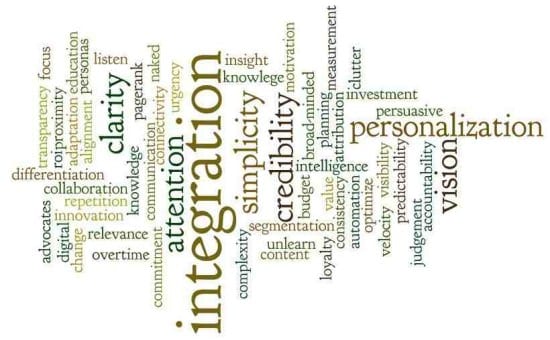Are you on first-name terms with your buyer personas?
Do your marketing strategy meetings discuss ‘Jason’s’ likely reaction to the new launch, and why ‘Sharon’ is the target for the upcoming campaign?
Experienced buyer persona users understand a buyer persona’s power to generate great insight and high confidence in marketing and business decisions; transforming a marketer’s ability to impact buyer attitudes on solutions and brands.

Buyer personas can break down barriers between sales and marketing by enabling both groups to share a good understanding of what action is required to address buyer needs.
And, insight into the buying process helps each team visualize their revenue contribution at each stage in the purchase process.
As companies learn to appreciate personas’ ability to predict buyer behaviour with uncanny accuracy, marketers can find themselves awarded a place at the strategy table thanks to their insight on key issues influencing buyers which, in turn, determine the company’s future.
When all media channels answer the buyers’ exact questions in plain language, trust in that brand builds and competition melts away.
This ‘magic’ only happens when buyers see a brand offers a solution that perfectly fits their definition of a problem.
The buyer persona value proposition
Although the value proposition for buyer personas is well understood, confusion still exists about what to include and how to build them.
The concept is equally likely to be over-simplified or over-complicated.
Marketers know that personas have the capability to deliver access to incredibly actionable, unambiguous information on how to reach and motivate target buyers through example buyers that are both real and persuasive.
Deep accurate buyer insights guide marketers, enabling them to gain in decision-making confidence in nearly every aspect of marketing, from content to product design, lead generation to business strategy and sales enablement to segmentation.
There have been many retweets about ‘eight personas that sales people need’, ‘four consumer buyer personas’ and ‘six ways to build your personas simply by observing their online behavior’.
If only it were that easy.
To be effective, personas need to be defined by more than demographics - marketers ultimately need buyer personas that real and persuasive enough to allow internal stakeholders to be on first-name terms with each of them.
Creating effective buyer personas
Buyer personas are a tool and, like most tools, their attributes and the investment needed to create them vary dramatically depending on the marketing situation.
Always start the creation process with a specific goal that allows you to be practical about your investment.
It is important to impress stakeholders as quickly as possible to secure their support for the training and resources involved in broader persona implementation.
Planning your buyer persona initiative involves weighing up relevant insights and determining the required confidence level in persona performance.
Determine which buyer insights are relevant
The insights you include in your persona must be focused on a specific product, service or solution the buyer is considering.
It is highly unlikely that such insights will be the same for all your solutions.
Relevant insights vary according to the decisions you want to impact; for example:
- Content placement – Where does the buyer looks for useful information about this category of solution?
- Content creation and messaging – On what criteria will the buyer evaluate, how will that buyer measure success, what would interfere with their decision to buy from you?
- Leads/demand generation – Which of several buying influencers has a priority initiative that could be satisfied by your solution? It often is not the economic buyer!
- Sales enablement - Which buyer persona is most willing to meet with your sales rep (i.e. lead/demand generation)? What does each buyer persona need to learn at each stage of the buying process (i.e. message/content development)?
- Marketing budgets or strategic planning - All of the above...
Establish the required persona confidence level
It can be helpful to equate ‘confidence’ to the required ‘sharpness’ of the tool…….
The complete absence of a buyer persona means you are working with a very blunt instrument indeed - Making Stuff Up.
At the other extreme is a blade that’s been finely honed through extensive (expensive) qualitative and quantitative research on each one of the twenty or so buyers who impact every decision on every strategic marketing solution.
Deciding what confidence level you need in your persona is very much influenced by the level risk involved in making the wrong decision.
Focusing on a given decision allows the team to make the best choices on both insights and confidence.
Start creating your personas
The general starting point for buyer persona creation is five-to-eight in-depth interviews with two or three different types of buyers.
These personas are typically key target segments in a critical launch or other important initiative where it is obvious that the old blunt tools are inadequate.
In especially critical or high risk decision making, the number of interviews should be expanded or a survey be used to validate the interview findings.
A final word of caution - “Move slowly”.
I’ve seen companies that try to accomplish too much too quickly. Personas can drive significant changes in culture, process and training and these changes evolve naturally in companies that right-size their initial investments.

Thanks to Adele Revella for sharing her expertise on personas. Adele is founder of the
Buyer Persona Institute and author of the
Buyer Persona Blog you can follow her on
Twitter - @buyerpersona. Interested in learning more about buyer personas? Please join Adele on Feb. 23 at 12 p.m. for her online seminar,
How to Build Personas that Persuade Buyers and Increase Sales.




 Thanks to Adele Revella for sharing her expertise on personas. Adele is founder of the
Thanks to Adele Revella for sharing her expertise on personas. Adele is founder of the 


